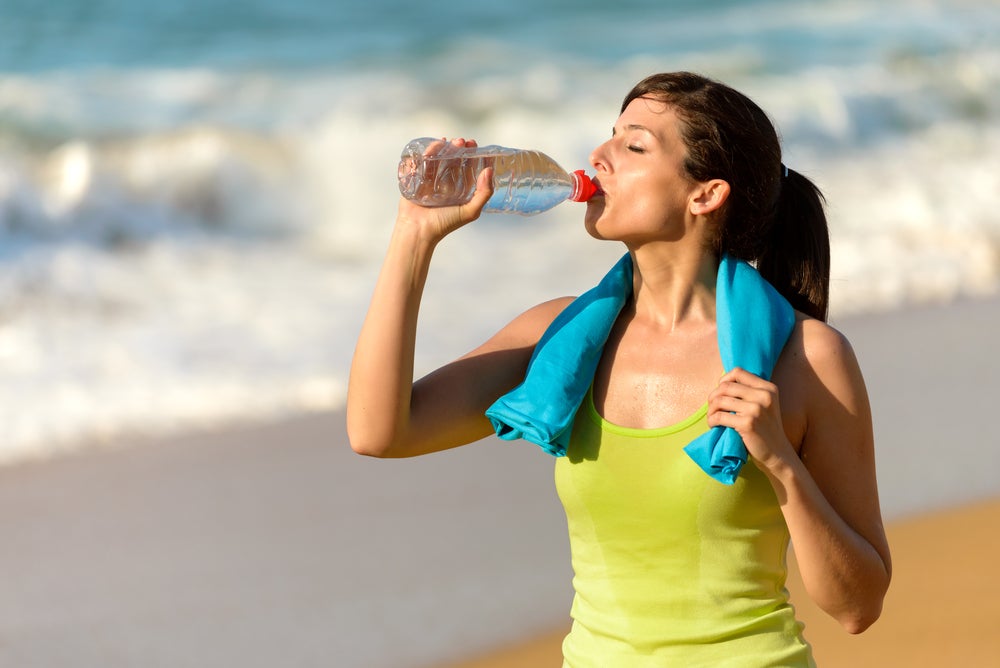Daily Hydration Essentials

Photo: <a href=http://shutterstock.com>Shutterstock.com</a>
Paying attention to fluid intake during activity, as well as nonactive hours, is equally important.
Water is one of the most essential nutrients for the endurance athlete. Some two-thirds of your total body weight is water, and this remarkable substance plays an important role in every major organ and system keeping you alive. We’ve all seen the need for hydration in a sweat-logged athlete. But for the athlete, the distraction of daily life can make it easy to forget to keep drinking water regularly. Many athletes also have not taken the time to learn and practice valuable daily hydration strategies. While much research and emphasis has been placed upon an endurance athlete’s fluid intake directly before, during, and after training or racing, emptying your bottles of fluid during a swim, bike ride, or run is only one of many hydration strategies essential for top performance. Paying attention to daily fluid intake during nonactive hours is also important. Nevertheless, daily water and fluid intake is often a secondary nutritional consideration, and many athletes frequently fall short on the everyday consumption of this life-sustaining nutrient.
How To Hydrate Properly
Years of hydration research indicate that athletes should try to prevent even mild levels of dehydration. Although an athlete may not always be aware of how much he or she is sweating, even relatively small fluid losses during training and competition can be significant enough to hinder performance. And sweating doesn’t take place only during hot weather; it takes place in the gym, in cool weather, and during outdoor winter workouts as well. Studies demonstrate that even in thirst-inspiring hot weather, athletes usually fail to replace all the fluid that is lost through sweat during training and competition. To prevent any adverse performance effects, every athlete should arrive for training sessions optimally hydrated, and to do so means staying on top of your daily fluid intake.
It is essential that you stay on top of your fluid needs by drinking a minimum of 11 to 16 cups (2.7–3.8 L) of fluid daily for basic hydration requirements when not training. Try to drink on a schedule of 8 ounces (240 ml) every hour on average. Water should make up about half of your daily fluid intake, but you can also receive hydration benefits from other fluids. Juice, dairy milk, soy milk, soup, and various sports nutrition supplements can be good choices. Some foods— especially fruits and vegetables—contain a high percentage of water and can also contribute fluid to your daily diet. Endurance athletes with very high energy requirements can consume high-calorie drinks such as juices and smoothies to assist them in meeting their fluid, carbohydrate, and energy needs. Caffeinated beverages can be incorporated into your diet in reasonable amounts, but they should not be your first choice prior to and after training. Overdoing your caffeine intake can also interfere with your sleep patterns and make you nervous and jittery.
RELATED: Hydration Tips For Triathletes
Check Your Hydration Status
You can monitor your hydration status by checking the color and quantity of your urine. Clear or lemonade-colored urine reflects adequate fluid intake, while darker or apple juice–colored urine, or a smaller volume of urine, indicates that you need to step up your fluid intake. Urine tends to be more concentrated when you first wake up, but it should become clearer throughout the day. You should urinate at least four full bladders every day. Certain vitamin supplements can darken or add a neon-glow quality to your urine, so volume rather than color may be a better indicator of hydration status if you take them. Regular monitoring of your weight during heavy training periods can also be helpful in judging fluid balance. If you notice significant weight losses at morning weigh-ins, this may be an indicator of chronic dehydration.
It is definitely worthwhile to focus on your daily fluid intake and make the effort to improve in this area. Athletes who have developed techniques for increasing their fluid intake have consistently found that improved hydration results in enhanced recovery and higher energy levels. Improving your hydration levels is really very simple. Just plan ahead and make sure that water and other hydrating fluids are available for consumption throughout the day. This will ensure that you begin your training sessions with a well-hydrated body.
RELATED – Eat Right: Most Hydrating Foods
This article adapted from the new edition of Sports Nutrition for Endurance Athletes by Monique Ryan, MS, RD, CSSD, LDN with permission of VeloPress.
About The Author:
Monique, Ryan, MS, RD, CSSD, LDN, is a seasoned and trusted sports nutritionist with nearly 30 years of professional experience helping elite and age-group endurance athletes and major league sports teams to optimize their nutrition. She is also the founder of Personal Nutrition Designs, based in the Chicago area.